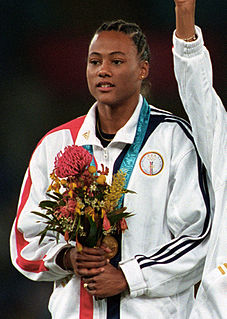Related Research Articles

Marion Lois Jones, also known as Marion Jones-Thompson, is a Belizean-American former world champion track and field athlete and former professional basketball player. She represented the United States and won three gold medals and two bronze medals at the 2000 Summer Olympics in Sydney, Australia, but was later stripped of her medals after admitting to steroid use.

Tetrahydrogestrinone (THG), known by the nickname The Clear, is a synthetic and orally active anabolic–androgenic steroid (AAS) which was never marketed for medical use. It was developed by Patrick Arnold and was used by a number of high-profile athletes such as Marion Jones and Dwain Chambers.
A non-denial denial is a statement that, at first hearing, seems to be a direct, clearcut and unambiguous denial of some alleged accusation, but after being parsed carefully turns out to not be a denial at all, and is thus not explicitly untruthful if the allegation is in fact correct. It is a case in which words that are literally true are used to convey a false impression; analysis of whether or when such behavior constitutes lying is a long-standing issue in ethics. British newspaper The Sunday Times has defined it as "an on-the-record statement, usually made by a politician, repudiating a journalist's story, but in such a way as to leave open the possibility that it is actually true".
A shield law is legislation designed to protect reporters' privilege. This privilege involves the right of news reporters to refuse to testify as to the information and/or sources of information obtained during the news gathering and dissemination process. Currently, the U.S. federal government has not enacted any national shield laws, but most of the 50 states do have shield laws or other protections for reporters in place.
The Bay Area Laboratory Co-operative (BALCO) (1984–2003) was an American company led by founder and owner Victor Conte. In 2003, journalists Lance Williams and Mark Fainaru-Wada investigated the company's role in a drug sports scandal later referred to as the BALCO Affair. BALCO marketed tetrahydrogestrinone, a then-undetected, performance-enhancing steroid developed by chemist Patrick Arnold. Conte, BALCO vice president James Valente, weight trainer Greg Anderson and coach Remi Korchemny had supplied a number of high-profile sports stars from the United States and Europe with "the Clear" and human growth hormone for several years.
Branzburg v. Hayes, 408 U.S. 665 (1972), was a landmark decision of the US Supreme Court invalidating the use of the First Amendment as a defense for reporters summoned to testify before a grand jury. The case was argued February 23, 1972 and decided June 29 of the same year. The reporters lost their case by a vote of 5-4. This case is cited for the rule that in federal courts, a reporter may not generally avoid testifying in a criminal grand jury, and it remains the only case in which the U.S. Supreme Court has considered the use of reporters' privilege.
Victor Conte Jr. is a former bassist with Tower of Power and the founder and president of Bay Area Laboratory Co-operative (BALCO), a sports nutrition center in California. He served time in prison in 2005 after pleading guilty to conspiracy to distribute steroids and money laundering. He currently operates Scientific Nutrition for Advanced Conditioning.
Charles Merrick Francis was a Canadian Olympic sprinter and sprint coach most noteworthy for being the trainer of sprinter Ben Johnson, the first competitor to be stripped of an Olympic gold medal for using banned drugs, and sprinters Angella Issajenko, Mark McKoy, and Desai Williams. Francis was banned by Athletics Canada following his admissions at the 1989 Dubin inquiry that he had introduced Johnson to steroids.
The CIA leak grand jury investigation was a federal inquiry "into the alleged unauthorized disclosure of a Central Intelligence Agency (CIA) employee's identity", a possible violation of criminal statutes, including the Intelligence Identities Protection Act of 1982, and Title 18, United States Code, Section 793.

James Risen is an American journalist for The Intercept. He previously worked for The New York Times and before that for Los Angeles Times. He has written or co-written many articles concerning U.S. government activities and is the author or co-author of two books about the Central Intelligence Agency (CIA) and a book about the American public debate about abortion. Risen is a Pulitzer Prize winner.
Greg F. Anderson is an American personal trainer, best known for his work with baseball player Barry Bonds, and links with BALCO.

Game of Shadows: Barry Bonds, BALCO, and the Steroids Scandal that Rocked Professional Sports is a bestselling non-fiction book published on March 23, 2006 and written by Mark Fainaru-Wada and Lance Williams, reporters for the San Francisco Chronicle. When Sports Illustrated released excerpts from the book on March 7, it generated considerable publicity because the book chronicles alleged extensive use of performance-enhancing drugs, including several different types of steroids and growth hormones, by San Francisco Giants outfielder Barry Bonds.
Reporter's privilege in the United States, is a "reporter's protection under constitutional or statutory law, from being compelled to testify about confidential information or sources." It may be described in the US as the qualified (limited) First Amendment or statutory right many jurisdictions have given to journalists in protecting their confidential sources from discovery.
Trevor Graham is a Jamaican-born American former sprinter and athletics coach. Following the BALCO scandal, the US Olympic Committee barred him indefinitely from all its training sites.
The Plame affair was a dispute stemming from allegations that one or more White House officials revealed Central Intelligence Agency (CIA) agent Valerie Plame Wilson's undercover status. An investigation, led by special counsel Patrick Fitzgerald, was started, concerning the possibility that one or more crimes may have been committed. The initial focus was on Scooter Libby; however, he was not the primary source of the leak.

Mark Fainaru-Wada is an American journalist and writer, working for ESPN since 2007. He formerly was a reporter with the San Francisco Chronicle, where he and Lance Williams achieved fame in covering the BALCO steroid scandal. He is co-author of Game of Shadows with Williams, a 2006 book about the BALCO scandal, and League of Denial, co-written with his brother Steve Fainaru, a 2013 book about traumatic brain injury in the National Football League. For his co-reporting with Williams, Fainaru-Wada received a George Polk Award, Edgar A. Poe Award, Dick Schaap Award for Outstanding Journalism and Associated Press Sports Editor Award. League of Denial earned Fainaru-Wada a 2014 PEN/ESPN Award for Literary Sports Writing, and was adapted into a Frontline documentary, which received a 2013 Peabody Award.

Norboletone (INN), or norbolethone, is a synthetic and orally active anabolic–androgenic steroid (AAS) which was never marketed. It was first developed in 1966 by Wyeth Laboratories and was investigated for use as an agent to encourage weight gain and for the treatment of short stature, but was never marketed commercially because of fears that it might be toxic. It subsequently showed up in urine tests on athletes in competition in the early 2000s.
The BALCO scandal was a scandal involving the use of banned, performance-enhancing substances by professional athletes. The Bay Area Laboratory Co-operative (BALCO) was a San Francisco Bay Area business which supplied anabolic steroids to professional athletes. The incident surrounds a 2002 US federal government investigation of the laboratory.

The Barry Bonds perjury case was a case of alleged perjury regarding use of anabolic steroids by former San Francisco Giants outfielder and all-time Major League Baseball career home run leader, Barry Bonds, and the related investigations surrounding these accusations. On April 13, 2011, Bonds was convicted of one felony count of obstruction of justice for giving an incomplete answer to a question in grand jury testimony. A mistrial was declared on the remaining three counts of perjury, and those charges were dropped. The obstruction of justice conviction was upheld by an appellate panel in 2013, but a larger panel of the appellate court overturned the conviction in 2015.
Jeff Novitzky is the current Senior Vice President of Athlete Health and Performance for the UFC, the world's largest mixed martial arts (MMA) promotion. He previously served as an special agent for the Food and Drug Administration, investigating the use of steroids in professional sports. Before April 2008 he was a special agent for the Internal Revenue Service who investigated the use of steroids for over five years. Novitzky's work has been credited with "changing the face of sports."
References
- ↑ "George Polk Awards for Journalism press release". Long Island University. Retrieved November 22, 2006.
- ↑ "Judge: Reporters must reveal sources in Bonds case"
- ↑ "ESPN Beefs Up Steroid Expertise". Broadcasting and Cable. Archived from the original on November 16, 2007. Retrieved December 7, 2007.
- ↑ Joe Strupp, "Lance Williams to Write for CIR", Editor and Publisher (July 31, 2009) Archived August 2, 2009, at the Wayback Machine
- ↑ "Judge Orders 2 Reporters to Testify in Steroids Case". www.editorandpublisher.com. Editor and Publisher. August 15, 2006. Retrieved March 24, 2019.
- ↑ Justice Department on steroids August 20, 2006
- 1 2 3 Lance Williams: 'Government Bent Over Backwards To Protect Drug Users' August 22, 2006
- ↑ BALCO journalists find ally in Conyers January 18, 2007